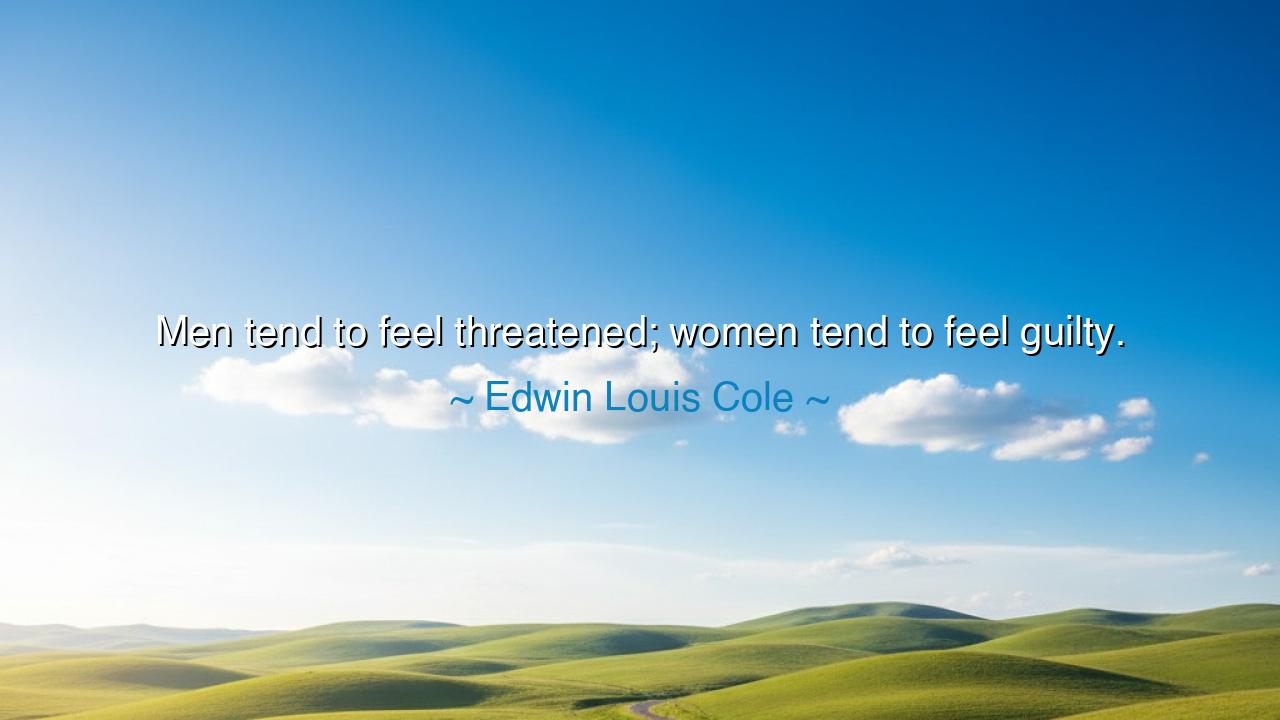
Men tend to feel threatened; women tend to feel guilty.






The words of Edwin Louis Cole strike at the hidden chambers of the human heart: “Men tend to feel threatened; women tend to feel guilty.” This is not a statement of condemnation, but of observation, born of the ancient patterns of human nature. It speaks to the burdens carried by both genders—the threat that gnaws at a man’s pride and the guilt that weighs upon a woman’s spirit. These are not eternal laws of fate, but tendencies shaped by culture, history, and expectation. Yet, like all truths, they reveal something of the soul’s struggle between strength and vulnerability.
The ancients understood that men, schooled in the ways of conquest and guardianship, were often quick to feel threatened when their power or authority was questioned. Pride, bound to honor, could be easily wounded, and thus many wars, duels, and rivalries were born from this fear of being diminished. Women, on the other hand, burdened through centuries with the expectation of nurturing, obedience, and sacrifice, were conditioned to carry guilt when they failed to meet the unyielding standards laid upon them. Thus, two chains were forged: one of threat, the other of guilt, and humanity has long borne the weight of both.
History gives us clear illustrations. Consider the tale of Cleopatra, queen of Egypt. Men around her—from Julius Caesar to Mark Antony—were both captivated and unsettled by her presence. Her intelligence and command were perceived as threatening, not because she lacked grace, but because she wielded power in a world that demanded women remain subordinate. At the same time, countless women throughout history, denied authority, internalized their limitations as guilt—believing themselves at fault for desiring freedom or greatness. Both patterns reveal the distortions that arise when society binds men and women in roles that stifle their true being.
Yet we must not think this truth is unchangeable. For there are also those who have broken free. Abraham Lincoln, though burdened with melancholy and beset by enemies, learned not to react with fear when threatened, but to temper his strength with humility. Eleanor Roosevelt, once filled with guilt for not fitting the traditional mold of beauty or compliance, transformed her burden into fuel for service, becoming one of the greatest voices for justice of her age. These lives show us that while Cole’s words reveal common tendencies, they need not dictate destiny.
The deeper meaning of this quote is this: both men and women are caught in cycles that steal their freedom of spirit. Men, enslaved by their fear of losing control, may lash out defensively instead of embracing growth. Women, imprisoned by inherited guilt, may silence their voices instead of rising boldly. True liberation comes when man learns courage without pride, and woman learns compassion without self-condemnation. Then, both can meet as equals, not as rivals or victims, but as partners in the great work of life.
The lesson to be carried is timeless: recognize the chains that bind you, and do not mistake them for your essence. Men, when you feel threatened, ask whether the danger is real or only the shadow of wounded pride. Women, when you feel guilty, ask whether the fault is true or merely the weight of unjust expectations. In this practice lies freedom, and in freedom lies the possibility of harmony between the sexes.
Practical action lies before each of us: cultivate self-awareness. Men should practice humility and listen without fear when their power is questioned. Women should practice confidence and speak without apology when their voice is needed. And all should learn to extend grace—to themselves and to others—knowing that both threat and guilt are not destiny, but obstacles to overcome.
So let us remember the wisdom in Cole’s words: men tend to feel threatened, women tend to feel guilty, but neither must remain bound by these chains. The path of wisdom is to transcend them, to rise above pride and beyond guilt, and to walk together as equals, whole and unburdened. In this, we honor both ourselves and the divine Spirit that made us.






AAdministratorAdministrator
Welcome, honored guests. Please leave a comment, we will respond soon